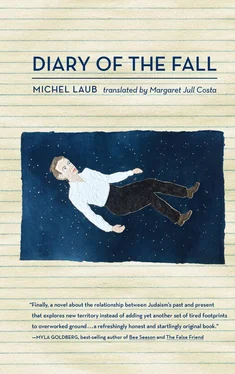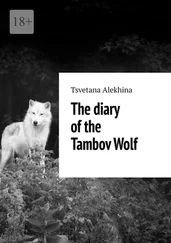21.
I’m incapable of remembering what my father smelled like when I was a child. People’s smell changes with age, just as their skin and their voice change too, and when you speak of your childhood it may be that you associate the image of your father then with the image you have of your father now. And so when I remember him bringing me a tricycle as a present, or showing me how a sewing machine works, or asking me to read out a few words from the newspaper, or talking to me about the things one talks about with a child of three, four, seven, thirteen, when I remember all those things the image I have of him is the image I have of him today, his hair and face, my father much thinner and wearier and more bent than he is in old photos that I’ve only ever seen at most five times in my life.
22.
When I remember my father forbidding me to change schools, the voice I hear is his voice today, and I wonder if something similar is happening with him: if the memory he has of me at thirteen gets confused with the image he has of me now, after everything he has learned about me in the last almost three decades, an accumulation of facts that erase all the stumbling blocks along the road to here, and if what I experienced as a decisive chapter in my life, the argument we had over my wanting to change schools, might for him be merely a banal fact, one of the many things that happened at home and at work and in the life he had with my mother and with the other people who were around during his son’s adolescence.
23.
During the quarrel we had over the new school, I told my father that I didn’t give a toss about his arguments, that using Judaism as an argument for not changing schools was ridiculous. I said I didn’t give a toss about Judaism, still less about what had happened to my grandfather. It isn’t the same thing as saying out loud that you hate someone and wish them dead, but anyone who has a relative who spent time in Auschwitz can confirm the rule that, from childhood on, you know that you can speak lightly about anything but that, and so my father’s reaction to my remark was predictable enough, repeat what you just said, go on if you’re brave enough, and I looked him straight in the eye and said, very slowly this time, that he could stick Auschwitz and Nazism and my grandfather up his arse.
24.
My father had never laid a hand on me before, and it may be that I was one of those children who had been spoiled by not having been brought up with strict enough boundaries, a rich little thirteen-year-old who wasn’t used to being given a slap and to accepting that this was simply the way things are, and even if the slap hadn’t really hurt and I’d been tall enough or strong enough to inflict some damage on my father in any physical confrontation, the normal response would have been for me to recoil before that show of authority. But that isn’t what happened: he hurled himself upon me and I tried to extricate myself, then he got a firm hold on me and hit me several times, on the back, on the neck, until his anger passed and he slowly loosened his grip and lay me down on the ground, my ears burning, a breathing space before I could get to my feet, my whole body trembling, and finally pull myself together.
25.
Even now I still wonder what would have happened if there had been no fight, if my father hadn’t changed as if overnight and stopped talking to me about my grandfather, as though the fight had created a tacit understanding, with him sensing that it wasn’t Nazism and Auschwitz that were at stake, because I knew very little about Nazism and Auschwitz, but whatever it was that I felt to be at the root of what had happened to João.
26.
If I were to talk now to any of the classmates who were involved in João’s fall, it’s likely that none of them would remember the details of the party or the reasons that led us to hatch that plan, and that none of them would make the link between carrying it out and the fact that João was not a Jew, because social conventions and the rules of etiquette and the self-image that each would have constructed of himself over the ensuing years would have created defense mechanisms that prevented their memory from recording something like that.
27.
It’s possible that the same applies to everyone who had anything to do with the school, classmates, parents of classmates, the staff — student coordinator, the teachers, they might even say that my version of the story was a distortion, a false memory influenced by my subsequent feelings, the trauma of spending a year dreaming over and over about João’s fall, because it’s ridiculous even to think that such a thing could happen in the 1980s in a Jewish school in Porto Alegre, a place attended by the sons of tradesmen and factory-owners and members of the liberal professions who had always lived alongside non-Jews, and there’s no record of any discrimination against Jews in the Porto Alegre of the time, no club that excluded Jews, no politician who spoke ill of Jews, no one who in the presence of family or friends or customers would dare say anything against the Jews, so it simply doesn’t make sense to think that the opposite could also happen, and if, say, such a thing were said at some point as a joke at school, that was no reason for someone to get so upset that it would cause him to change the way he lived the rest of his life.
28.
In the case of my father, I don’t know if he changed because of the fight itself and because he went to bed that night troubled by the fact of having attacked his thirteen-year-old son for the first time ever, a shock to the self-image he had created up until then, to his certain belief that he would never be capable of hurting his son, or because pushing me and grabbing me around the neck and punching me could not only have caused injury, it was also capable of provoking in me an entirely unforeseeable reaction — and so I don’t know whether he went to bed troubled by the fact of having attacked me or by that reaction.
29.
Until João’s fall, I had never done anything like that either or even felt capable of it. My father was in the doorway staring at me perplexed, once I’d got to my feet after he stopped hitting me and I was aware of the pain and the possible bruises and an anger I had never felt before, and even today I can still remember the look of alarm on his face when I picked up the first thing at hand, one of those heavy Scotch tape dispensers with sharp enough edges to dent someone’s head or put out their eye, and at that moment it was as if I were taking my revenge for everything that had happened that year, my classmates, the staff — student coordinator, my father who seemed so vulnerable, and if he hadn’t managed to step out of the way or if I hadn’t miscalculated when I threw the tape dispenser or a combination of both those things, that could have been the second tragedy of the year.
30.
The day after the fight, my father told me all the details of my grandfather’s story. I had spent the day in my room, and he knocked on the door and said we had to talk. He sat down on a stool by my bed and, after apologizing, he then politely told me off for what I’d said and done, and asked that it never happen again because he was too old for that kind of thing and, besides, there was my mother to consider, and I could almost swear that in his voice there was not just guilt or sadness or disappointment, but an embarrassed kind of fear, as if he had found something out about me, a secret that had lain hidden for years, the threat inside his own house.
31.
My father told me about my grandfather’s final days, and that was enough for me to understand that I should never again treat the matter lightly. I realized that this was something I should respect as much as my father respected my right to study at a new school and, after that tacit agreement, my relationship with him became quite different: on that day my anger vanished, and in the weeks that followed it was as if everything went back to how it used to be before João’s fall, family suppers, weekends, the conversations in which I said little and simply listened to what my father had to say, although he was no longer trying to convince me of anything or condemning me for wanting to take the entrance exams for a school where there were no Jews, and for being admitted into a school where there were no Jews, and getting enrolled and waiting for the start of term at a school where I thought no one would ever even mention Jews, a story that could have remained frozen there, forgotten, if it hadn’t resurfaced decades later, when I was an adult and had left home, changed cities and become another person: João, my grandfather, Auschwitz and the notebooks, I only started thinking about all this again when I found out that my father was ill.
Читать дальше












